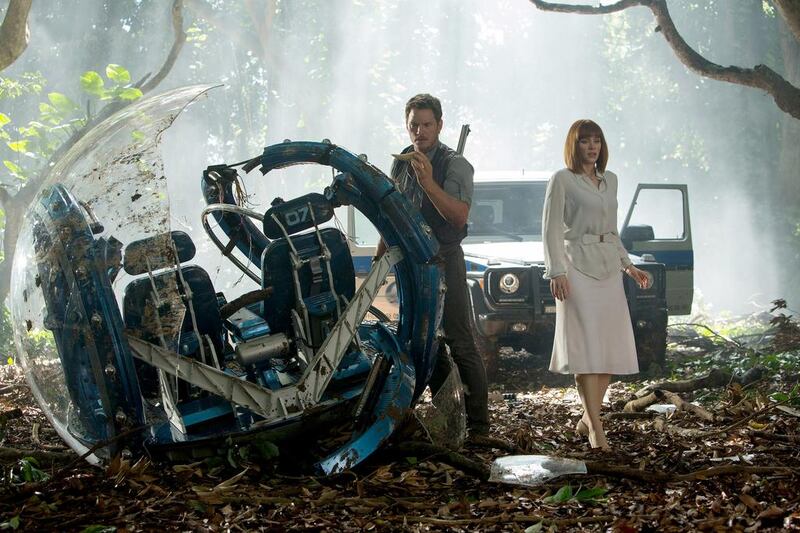From the recent Mad Max: Fury Road to the forthcoming Terminator: Genisys and Star Wars Episode VII: The Force Awakens, it seems this year Hollywood is intent on reuniting us with old friends.
"I think the reason why it's happening now is because there are certain stories we are realising are indelible," says director Colin Trevorrow. "They're as valuable to us as myths, fairy tales and fables. That's why Star Wars is back. New generations deserve new versions of these stories. I don't have a cynical view of it."
It would be hypocritical if he did. Trevorrow, whose only previous feature film was the excellent 2012 time-travel indie film Safety Not Guaranteed, is the 38-year-old behind Jurassic World. One of the summer's biggest blockbuster behemoths, it reintroduces us to the DNA-spawned dinosaurs first glimpsed in Steven Spielberg's 1993 classic Jurassic Park, where Richard Attenborough's billionaire entrepreneur John Hammond looked to create the ultimate theme park on a private island near to Costa Rica.
With two sequels – 1997's The Lost World: Jurassic Park and 2001's Jurassic Park III – the series has grossed around $2 billion (Dh7bn). But the past 14 years have seen numerous failed attempts to launch a fourth outing – until now. Co-written by Trevorrow and his writing partner Derek Connolly, three key story ideas come from Spielberg himself; first and more important, that the plot takes us back to the original Isla Nublar, where, finally, the park is open to the public. "A fully functional Jurassic Park is an awesome idea," says Trevorrow with a grin.
Another Spielberg notion was to include a park ranger able to train the vicious velociraptors; enter Chris Pratt, who plays the "raptor-whisperer" Owen Grady. The Guardians of the Galaxy star believes the right amount of time has elapsed to pick up the franchise.
“You have all the mythology and the history of the original movies to build on,” says the actor. “It’s been 22 years since the park opened and you have the idea that we get to see what John Hammond’s dream looked like. And Jurassic World is actually open … It’s exciting.”
In fact, we learn that the park has been open for a decade – and ticket sales are now dwindling. As Claire Dearing, the park’s operations manager played by Bryce Dallas Howard, notes in the film: “No one’s impressed by dinosaurs anymore.”
It’s why the island’s boffins, led by Dr Henry Wu (played by B D Wong, the only actor from the original 1993 movie to return), have been working on a top-secret project: a new genetic-hybrid dinosaur, the Indominus rex. Raised in isolation, the fearsome beast escapes to wreak havoc on unsuspecting visitors – the third idea from Spielberg.
The way Trevorrow sees it, the desire to create a new dinosaur rather reflects the difficulties in setting out to make another Jurassic Park movie. "We've reached this point where not only are we not impressed, but we're always waiting to be entertained by the next thing." Trevorrow didn't simply want to make yet another story about the dangers of scientific meddling.
“We’ve seen that movie,” he says. “Why not talk a little bit about excess? Something that’s personal to me – we’re surrounded by wonders and yet we are constantly looking for more.”
Certainly Trevorrow has crafted a very contemporary Jurassic movie (and not just because it’s in 3-D). Yet it’s not hard to sense that there is nervousness about a production that cost US$150 million.
As Pratt says: “Colin said: ‘Listen, if this movie doesn’t work – Steven Spielberg is going to be fine.’ But if this doesn’t work, Colin’s [finished] and same with me. It’s more than just the franchise on the line – it’s our own careers, too. We both care very deeply about it. So we worked very, very hard to make it real, make it compelling and to take it seriously.”
While Trevorrow delivered on time, under budget and with no reshoots required, there have been doubting Thomases in the blogosphere. Not least The Avengers director Joss Whedon, who commented on Twitter about a clip released in advance that shows Pratt and Dallas Howard bantering.
“I’m too busy wishing this clip wasn’t 1970s era sexist,” he tweeted. “She’s a stiff, he’s a life-force – really? Still?” Trevorrow shrugs. “I didn’t necessarily disagree with him, specifically about the scene. [When you see the whole movie] it’s part of the design.”
The way Pratt sees it, the battle-of-the-sexes back-and-forth is a deliberate nod to Spielberg.
"Owen and Claire's relationship is similar to some of the relationships in the Indiana Jones films," he says. "You've never seen that in a Jurassic Park movie but you have seen it in Steven Spielberg movies."
As much as Jurassic World is a nod to the enduring appeal of dinosaurs and the excess of blockbuster culture, it's also a tribute to the legendary director himself. "This was his franchise and it is very personal to him," says Trevorrow. "He loves dinosaurs. What can you say?"





